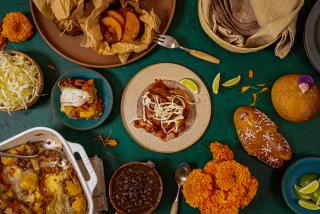Mild-Mannered Tropics
- Share via
LAKE FOREST — A taste of El Salvador has come to South County with the opening of El Curtido, a modest storefront with travel posters on its walls and tropical oilcloths on the tables. It takes its name from a popular Salvadoran condiment.
Almost as soon as you are seated, the waitress brings a huge, lidded Mason jar of curtido. Though it looks like cole slaw, the crisp shredded cabbage is mixed with thinly sliced carrots and a light, spicy vinegar dressing, rather than mayo.
Curtido is the universal condiment on Salvadoran tables. Most of El Curtido’s customers eat it in heaps on El Salvador’s national dish, the fat, round cornmeal breads called pupusas.
I had my first pupusa at a taco truck in East L.A., and I’ve been eating them regularly since. Pupusas are easy to eat and deceptively filling. One is an ideal snack; two or three, plus a little curtido, and you have a meal.
The cakes are cooked on a griddle like sopes, the fat cornmeal cakes that have become fashionable in our Mexican restaurants, but the similarity ends there. The distinctive thing about pupusas is that they are stuffed--with deliciously gooey fillings.
El Curtido’s most popular pupusa is the revuelta. For this specialty, the cake is stuffed with crumbled cotija cheese, refried beans and crunchy pork cracklings.
Another popular filling is queso con loroco. This is made by combining the same cheese with loroco, a dried flower bud with a taste some liken to white asparagus.
El Curtido serves both of these pupusas piping hot, and both practically melt in the mouth.
Corn also is the basis for Salvadoran tamales, complex masa cylinders stuffed with olives, potatoes and shredded, stewed meats. El Curtido stuffs tamales with chicken, pork or a mixture of sweet corn and thickened cream, and then gives you the option of having them deep-fried or steamed. I prefer them steamed, and I would come back just for the steamed chicken tamale, which is sweet, light and loaded with meat.
Though El Salvador’s cuisine is based on much the same ingredients as Mexico’s, few dishes at El Curtido would be mistaken for Mexican. Salvadoran food is mild and tropical, without the fiery character that Mexican food is known for.
Meats are extremely popular in Salvadoran cooking, especially in soups and stews. Among the few sautes at El Curtido is salpicon, an appealing dish of finely minced beef mixed with onions, chilies and mint. The dish is typically eaten with rice and boiled beans.
The restaurant’s best stew is carne guisada, big chunks of tender beef cooked with potatoes and carrots. The components soak up a grainy sauce based on ground pumpkin and annatto seeds, scented with garlic and onions. The same good sauce is used for a fall-off-the-bone-tender chicken stew.
El Curtido’s kitchen excels at soups. Salvadoran soups have a hearty, rustic quality and are accompanied by fat corn tortillas that turn them into complete meals. Think of sopa de pata as the Salvadoran equivalent of menudo. It’s a rich, beefy broth with four or five pieces of calf’s foot, dollar-bill-sized pieces of beef tripe and big chunks of starchy yuca root.
Sopa de albondigas looks like Mexican meatball soup but doesn’t taste like it. Instead of a strong cumin flavor, these meatballs are redolent of garlic, onions and fresh mint--practically Middle Eastern.
Another soup that will cure your ills is sopa de res, a classic short rib soup. This hearty bowl is full of meaty short ribs, yuca, chayote squash and chunks of corn on the cob. It’s great comfort food.
The menu is not limited to the wildly exotic. At lunch, I love to order the pan con pavo, a stewed turkey sandwich on a French roll. There must be a half pound of turkey on this sandwich, along with lettuce, tomato and mayonnaise. And it’s only $3.95.
Then there are atoles, oddball hot beverages you drink right from the faux coconut shells they are served in. Atole de pina, with pureed pineapple, is sort of a tropical toddy with spices. Atole chuco, a beverage reputed to have been drunk by the Mayans, is made from black corn and pumpkin seeds and has a disconcertingly medicinal finish.
You can complement a meal here with more familiar aguas frescas such as tamarindo and horchata, both served ice cold. Tamarindo is the sweet-and-sour beverage flavored with tamarind and horchata. It is a milk-white drink made from boiled rice, sweetened and flavored with cinnamon. Both are highly refreshing thirst quenchers.
For dessert, try empanadas de platano, a pair of fritters made from mashed plantain, that starchy relative of the banana. You can have your plantains and eat them too, whenever the restaurant has platano frito con frijoles y crema, which is fried plantain slices served with sweet bean paste and thick, Salvadoran sour cream.
I’m not sure that Salvadoran food will become a trend, but I’m hoping that this engaging little restaurant will catch on quickly. If all ethnic cuisines were as well represented as this one is here, we’d really be in a quandary about where to eat.
El Curtido is inexpensive to moderate. Appetizers are $2.75 to $5.50. Soups are $5.25 to $9.95. Combo plates are $5.50 to $7.95.
BE THERE
* El Curtido, 23532 El Toro Road, Lake Forest. (714) 586-1477. Open 11 a.m.-2 p.m. and 5-9 p.m. Tuesday-Thursday, 11 a.m.-10 p.m. Friday-Sunday. Closed Monday. Cash only.
More to Read
Eat your way across L.A.
Get our weekly Tasting Notes newsletter for reviews, news and more.
You may occasionally receive promotional content from the Los Angeles Times.










